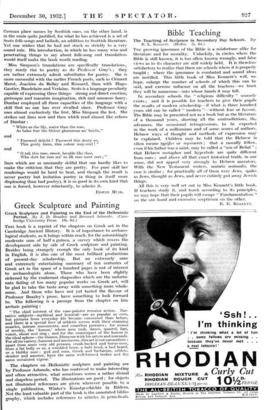Bible Teaching
Tim growing ignorance of the Bible is a misfortune alike for literature and for morality: Unluckily, in circles where the Bible is still known, it is too often known wrongly, and false views as to its character are still widely held. It is therefore satisfactory to realize that there are schools where it is properly taught ; where the ignorance is combated and sound ideas are instilled. This little book of Miss Kennett's will, we hope, enlarge the number of schools of which this can be said, and exercise influence on all the teachers—we trust they will be numerous—into whsoe hands it may fall.
In secondary schools the " religious difficulty " scarcely exists ; and it is possible for teachers to give their pupils the results of modern scholarship—if what is three hundred years old can be called " modern "—without fear or favour. The Bible may be presented not as a book but as the literature of a thousand years, showing all the contradictions, the advances, the occasional retrogressions, to be expected in the work of a millennium and of some scores of authors. Hebrew ways of thought and methods of expression may be explained. Children may be told that the Hebrew is often means typifies or represents ; that a rascally fellow, even if his father was a saint, may be called a "son of Belial " ; that Hebrew metaphor and hyperbole are quite different from ours ; and above all that exact historical truth, in our sense, did not appeal very strongly to Hebrew narrators. With the New Testament writers, tnutatis tnutandis, the case is similar ; for practically all of them were Jews, spike as Jews, thought as Jews, and never entirely put away Jewish things.
All this is very well set out in Miss Kennett's little book. If teachers study it, and teach according to its principles, we may hope that their pupils will escape " Fundamentalism " on the one hand and excessive scepticism on the other.
E. E. KELLETT.






























 Previous page
Previous page